Maewo (Asanvari) – Efate (Port Vila)
24/9/16
– 6/10/16
(Blog readers please note - by left clicking on photos you will see them full size and a photo gallery below. The same applies for previous blog posts..see blog archives below.)
A glance at the map of Vanuatu, to the
islands north of Port Vila, shows that a day’s sail north of Efate, the island
of Epi is reached, and it is here that sailors contemplate a “rectangle” shape
of islands ahead of them and often conclude that the most efficient way of
visiting them is to veer to the west to the larger islands of Malekula and
Espiritu Santo, before crossing the “top” to the east, via Ambae, before
returning down the “eastern side” via Maewo and Pentecost, to Ambrym and thence
back to Epi. For us, from Epi we will return to Port Vila, while others
continue on to the far northern Banks Group of islands, but we needed to be in
Vanuatu, earlier in the “season” to have headed there. As we dipped deeper into
spring, cruising yachts begin an exodus from Vanuatu, an escape before cyclone
season: some to New Zealand, others, like us to Australia, and others, north to
the Solomons where in the equatorial zone, the Coriolis effect that can spin
tropical lows into monsters, is too feeble to produce these super storms. We must
soon join the migrating yachts, and head for safer havens….like Coffs Harbor!
On Calista,
we did not have a sense of “heading south”, or “heading home”, because on Maewo,
Pentecost and Ambrym, we have saved some delights for last, like that roast
potato, at the end of a Sunday roast. In
leaving Ambae, for the anchorage of Asanvari on the southern end of Maewo
Island, we were heading for a place that other cruisers had enthused about, but
we preferred to go there and reserve judgement until we had seen it for
ourselves. A fair estimation of a cruising destination is to arrive there and find
a brace of yachts snared by its allure, and as we approached the sheltered bay,
under the “hook” of Teterigi Point, we were pleased to see some good friends
already there and others that we looked forward to meeting if they tarried in
Asanvari. Again we had Paul and Juan on Bumpy
Dog, Geoff and Di on Stylopora, but
there also, from Noumea, was Patrick and Murielle on the 52’ Grand Soliel yacht
Hieracon, and the Swiss couple
Patrick and Edith, on Solina, a large
circumnavigating catamaran.
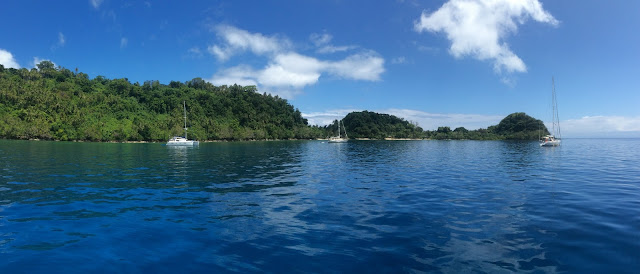 |
| Asanvari anchorage |
Maewo and Pentecost are slender isles, baton
like in shape, aligned approximately north to south and separated by the four
mile stretch of Lolvavana Passage. Both are approximately 30 miles in length,
with Maewo averaging a svelte 5miles in width, and Pentecost some two or three
miles broader. Maewo is precipitous in appearance, of dense sylvan presentation,
and altogether too formidable of form to have roads constructed to the villages
that cling precariously to its coastline. There are hence no cars on Maewo, no
airports either, and only the workmanlike supply barges, like Kalyara, link the inhabitants of this
remote isle to the outside world. Hence, after anchoring, in going ashore at
Asanvari through a small boat passage in the reef, we entered a world of neat
village dwellings, charming hedgerows, smiling faces, and a natural warmth of
welcome for those of us for us who have arrived by sea.
 |
| Local traffic |
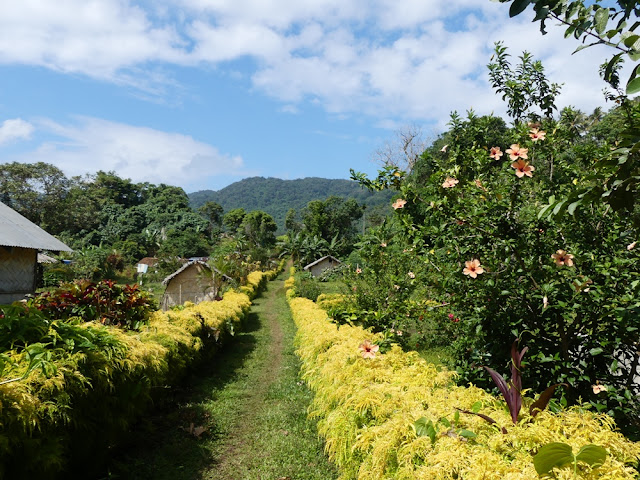 |
| The "main road " lined with gardens |
Visually, nature got things picture perfect
when crafting Asanvari, and to place the cherry on the top for dusty mariners
like us to refresh themselves, it has a deliciously cool waterfall, complete
with plunge pool leading to a free flowing stream for water replenishment which
doubles as a never ending torrent to wash one’s smalls. To luxuriate under the
waterfall and get a back massage from its generous cascade, was too good to be
true. Nearby, the good folk of Asanvari have completed the catering for
yachties by constructing the Sparkling
Waters Bar, although when a sunset get-together at the bar was proposed, to
the acclaim of all, Barry, the local convener, had to admit that, until the
supply boat came in, there were only six
beers in stock to go around! Yachties, though are resilient folks and
ship’s cellars were soon raided, condiments procured, and a fine gathering
assembled at the Sparkling Waters Bar
as if to usher us into Maewo life, Asanvari style. Barry’s wife had made some
delightful flower arrangements to grace the tables, and as the sun set over the
masts in the bay, it was hard to imagine being in a more inviting place than
this. Unplanned moments like this one, amongst like-minded souls as we were,
are a sheer delight, and added greatly to our experience in these distant
shores.
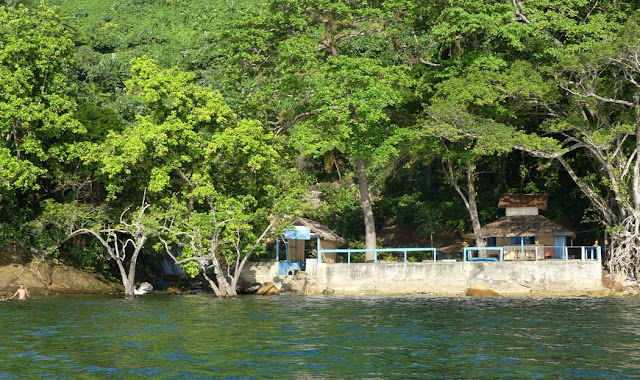 |
| Sparkling Waters Bar at the waterfall |
 |
| The beautiful waterfall |
 |
| Enjoying a back massage |
 |
| Sundowners at the Sparkling Waters bar |
Ashore, Asanvari is a “walking village”, with
leafy pathways that guide one past modest households where cheery faces emerged
to say hello, to ask our names and to find out from where we had come. The
local store was hard to find open, but just up from the beach, the
entrepreneurial Erica and her husband run a little eatery, with accommodation alongside,
to meet the demands of a tourism boom that may be a little time yet from
arriving. As a sideline Erica sells produce from her village garden, although
in noticing some excellent cowries that she had for sale, Cookie’s attention
was hopelessly drawn, and I knew that our on board collection was about to
expand. Erica can spot a shellaholic a nautical mile off. On our way back on
board, we met Columbus; not the celebrated explorer, but rather the celebrated
baker, who offers a unique service for early morning loafers, by paddling out
in his dugout canoe with freshly baked products literally hot from the oven.
True to his word, with a swish of his paddle and a tap on the hull, Columbus
duly delivered, and it is unlikely that, in the annals of seafaring, that a hot
and golden loaf has been fallen upon with greater alacrity than on this morning
on Calista. Saint Columbus!
 |
| Erica's restaurant |
 |
| Columbus' bread delivery |
The good Columbus and Erica, we found, were
not the only entrepreneurial souls in town, for when Patrick and Murielle drew
alongside in their duck they said that we were invited to a “cave snorkelling”
opportunity with Carl, a young local man who had developed a marine experience
for visitors drawn from the unique karst, or limestone topography found on the
seaward side of the village. He and his family had constructed a “Magas Cave
Tour” where from a purpose built shelter, snorkelers were guided to an
impressive underwater “dropoff”, with myriads of fish and an array of hard and
soft corals before being led through a circuitous limestone cave – not a place
for the claustrophobic – before emerging out of a paved sink hole in time for
garden fruits and fresh coconut juice in the pavilion. Fabulous!
 |
| Coral gardens |
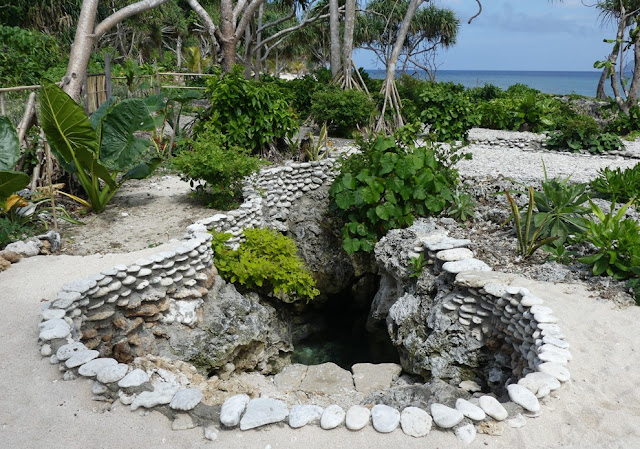 |
| The cave exit at the end of a lovely snorkel |
 |
| Carl & the snorkelling team ! |
At one time Asanvari, apart from the Sparkling Waters facility, had a “Yacht
Club” of sorts although in March 2015 Cyclone Pam demolished the structure and
it is now in the process of being rebuilt. According to Carl, we were the 62nd
yacht to drop anchor in Asanvari this “season” and we wondered, what with the
facility by the waterfall already in place, how there was a need for two yacht
facilities in Asanvari. Then, to add complication, the original chef who
prepared meals at Sparkling Waters has
decided to “go it alone” and offer meals from his village around from the
waterfall. Apparently, having facilities
for yachties, was driven by former Chief Nelson, whose strength of
character kept differing elements in the village on the same song-sheet, but
with his untimely demise a couple of years ago, there have been literally too
many cooks and not enough broth. Asanvari looks idyllic, and is idyllic, but on
the ground it is not necessarily utopia, Maewo style. We figured it best to
remain at arm’s length from village politics, because, apart from enjoying our
separation from the political world, here there are eminently better things to
do, and probably we were seeing inter-clan rivalries that have been entwined in
village life for aeons.
 |
| Construction of the new Yacht Club |
For us though, with days at a premium, and
longer range forecasts already predicting a return to stiffer trade winds later
in the period, we had to decide whether we would leave Asanvari. In the end its
attractions seduced us, and we stayed one more day, simply because we did not
want to leave. Besides, there was snorkelling still to be done and there was that
wonderful waterfall, which issued its watery symphony throughout the night, and
by day drew us to its aerated waters that were impossible to resist. In the
end, all five yachts decided it was time to leave, driven by the need to move,
as October drew nigh.
Our “move” was in truth not a big one, just a
dozen miles or so south, across Lolovana Passage to Loltong Bay, a favourite
haunt of Derek and Bela Reinemer, former owners of Calista and now proud owners of the Perry designed Pandana. Derek and Bela are regular
visitors to Vanuatu and it was unfortunate that in this, the year that we
visited here, family commitments elsewhere have kept them on other shores.
Knowing of Derek and Bela’s fondness for Loltong had us committed to calling
in, again, to see it for ourselves. Staying in touch with Derek and Bella,
after nearly 10 great years of owning Calista
has been cherished by us both. We can’t imagine this occurring following
the sale of a car, or a furniture setting for example. Yachts are in way living
things that are in a realm of their own. Yachts are family.
 |
| Calm passage to Loltong, Pentecost |
The anchorage at Loltong is partly protected
by two outer reefs, and there would be plenty of space for Hieracon, ourselves and the two other catamarans that were already
there, but for the need to leave space for inter-island roll-on roll-off
ferries to enter, manoeuvre, and draw alongside their beach-side staging point,
which here, as it would only be on Vanuatu, is under the spreading banyan tree.
We anchored, re-anchored and then moved again to a spot just out from shore
with the help of Patrick and Murielle who took soundings from their duck with
their portable depth sounder, which was, we concluded, a handy and helpful
piece of equipment.
 |
| Anchorage, Loltong |

We took no time in getting ashore, partly to
observe the hurly and burly of a ferry arrival, and thence to explore the
village. Tickets could be sold to a ferry arrival, with the throaty manoeuvring
of the ship, the pressing throng ashore as the drawbridge was lowered and the
myriad of parcels, bags, boxes and crates that found their way on and off the
ship in muscled arms, to a cacophony of Bislama, all at volume 10, as somehow
sense was made of the consignment madness that seemed to be unfolding in front
of us. Soon the ‘warehouse” under the Banyan was littered with produce and
supplies, and the only utility in town, a vehicle bearing a mixed grill of tyres
and a mechanical profile where, that it went at all, could be classified a
miracle. Through it all a throng of young men sat inert on the roots of the
Banyan tree, and remained so long after ferry growled its way out of the bay,
despite there being tasks all about, such as the lifting of boxes, and the
hauling of planks that cried out for attention. When life in the village
returned to its equilibrium, only a pig in a wooden crate remained of the cargo
from the ferry, left on a sandbar, with its anxieties rising along with the tide.
As we joined the stragglers who were heading for home, to our considerable
mirth, we came across the aforementioned utility, parked in the shade, with the
driver lying alongside, asleep. It was after all lunchtime siesta, and
apparently one ferry arrival, was maybe an arrival too many.
 |
| Unloading & collecting supplies.... |
 |
| but who's collecting the poor pig!? |
Directly ashore from where we were anchored
is found the Vatulo Yacht Club, brainchild
of Matthew and his wife Mary, who specialise in hosting traditional banquets, featuring foods drawn
uniquely from local gardens. The “Club” is adorned with flags and other
yachting memorabilia from around the world and alongside, Matthew is crafting
two cosy bungalows, to value add to what has already been created. After
arranging with Mary to host an evening at the club for boaties currently “in
residence”, we listened to Matthew’s advice that in order to “get to know”
Loltong and its people, it was a good idea to take the time to pause, find a
shady spot, and allow the people to connect with you.
 |
| Vatulo Yacht Club |
 |
| The village Banyan tree |
In a word, Loltong is a treasure. With
Matthew’s advice in hand, we found that a stroll through the centre of town
took a while, with locals ever ready for a chat, and in the event of feeling
fatigued, there are strategically placed public seats, deftly located in
dappled shade, for the wearied traveller to take it all in. Near village
central, the “main” road bends and in the crook thus formed, an extensive
slatted seat is a grand example of its kind, with generous shade and a garden
rockery to add to the scene. To sit here and contemplate the day is popular
with many of the menfolk, whilst in shaded alcoves, or in the community
Namakal, women cook, chat and work on handicrafts, and laugh, freely and
frequently. Down near the beach, whilst naked tots gambolled in the shallows
and shrieked in delight, a mixed gender game of soccer was being played with
the fervour of a World Cup final and no one seemed to care that the goals were
crooked sticks or that the ball had long since lost its air. All about,
chickens scratched, some with cloth strips on their wings to confirm ownership,
dogs of doubtful lineage ambled about, and pigs snorted in the bushes. Nothing
in Loltong seems hurried.
 |
| Village images........ |
 |
| Making kava |
 |
| Steep hilltop vegetable gardens |
Also under the resting place in the centre of
Loltong, we met a group from the Australian National University, whose members
were engaged in absorbing life and language in the village, in a more
professional manner than our own, as part of a move to record local customs and
tongues with the support and involvement of the community. Some group members
had been on Pentecost for weeks and here at Loltong they had obviously made
some very close friends. The researchers were Bislama fluent, and were making
efforts to record, like Brittany in Banam Bay, key features of languages that
were spoken and not recorded. A fear is, we suspect, that with phone towers
flourishing in the islands like tropical seedlings, and mobile phones making
rapid changes to village life, there was a fear that local languages might
easily disappear without trace, as new generations of young people in villages
became seduced by the new and abandoned the old.
 |
| Loltong Guesthouse & restaurant |
At the end of town a cement paved road makes
its way steeply out of town and from its summit a grand vista of the village
and the anchorage made the labour to get there worth every drop on the brow.
Near where the road beetles upwards we met Barnabus Vavo, at first glance a
languid storekeeper, but in reality a man with a remarkable story to tell. Some
years ago Barnabus “jumped ship” here, at the request of a couple on a large
cruising yacht, and spent six years with them, voyaging from PNG, to Fiji, to
New Zealand and on to Australia, where, to complete his portfolio at sea, he
completed a Sydney Hobart Yacht Race. With slender patronage at his shop, we
listened spellbound to Barnabus’ tales from the bounding main. His cruising
career came to a harrowing end somewhere off New Zealand, when an immense storm
dismasted their yacht and Barnabus was certain that he was about to disappear
into the Tasman, without a trace. Somehow they survived, limped back into port,
and Barnabus decided that maybe his roving days were over, and that returning
home, marrying and starting a family might be a good thing. He and his wife now
have four children – we met his delightful little daughter with Barnabus under
the shady tree in the centre of the village (where else!) – although we wondered
whether in quieter moments, his thoughts drifted to full sails, trade winds,
and exotic destinations. These things are all a long way from Loltong.
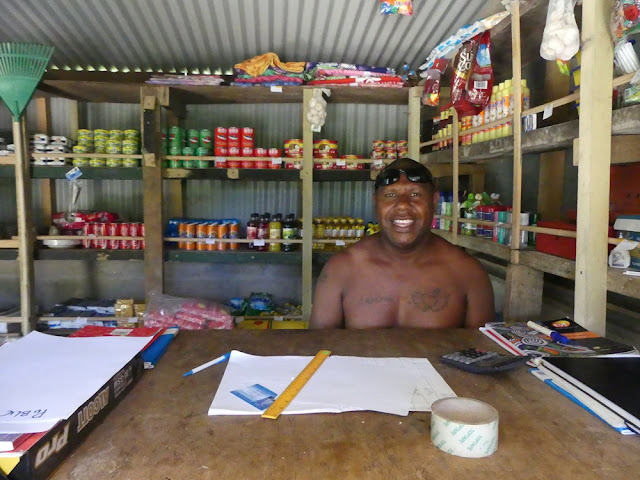 |
| Barnabus hard at work in his store! |
There are two schools in Loltong; one is a
“French” school, which we visited with Patrick and Murielle, who had a bag of
textbooks and materials from Noumea to donate, and the other, perching atop the
peninsula on the north side of the anchorage, was really in the village of
Labultamata, which is reached by boat or via a hike around the bay through the
forest. The forest trek proved to be a walk where in leafy glens, with giants of
the coastal rainforest lowering overhead, we thrilled to its arboreal splendour,
whereas for villagers and kids heading to school it was just the track to
Labultamata, and the path one trod in getting to school. Emerging at the
village, we met Franklin, who offered to show us around and to take us up to
the ridge above the houses where the school commanded a magnificent view back
along the coast to Maewo.
We arrived at the Labultamata Primary School
during a break, and to Franklin’s amusement little’uns were soon swarming about
us, in scenes reminiscent of the Pied Piper, or even Gulliver’s Travels.. A
horde of ebullient youngsters, like uncorked lemonade, ushered us in the
direction of the long suffering teacher, who was in her classroom, attempting
to snatch a moment of sanity, before we burst in with an army of effervescent
tykes in hot pursuit. She manufactured a gracious smile and showed remarkable
tolerance as we wrote our best wishes on the blackboard, complete with a map of
Australia showing where we lived, and then attempted to make some order amongst
the mayhem by taking a group photo of the assemblage. Then, not wishing to make
things worse than they were, I made a strategic error whilst attempting to
construct a form of retreat. I “hi fived” a wild-eyed urchin, clad in an
Australia t-shirt, and next thing all the
kids wanted a “hi five” and the cacophony rose again, to decibel levels
bordering on dangerous. In the end, what was meant as a goodwill visit,
probably sent the lovely teacher heading home at day’s end, reaching for her
analgesics. The walk back through the forest to Loltong, harkening to the gentle
lullaby of the birds, and feeling the soothing airs of the breeze through the
trees, was a salve to our nervous system.
 |
| Having fun with the local school kids! |

A wondrous evening at the Vatulo Yacht Club
then capped what had been an unforgettable sojourn in Loltong. Eight good souls
came ashore from vessels and we found ourselves in the expert hands of mine
hosts Mary and Matthew, her “front of house” Lofate, and very ably assisted by
Matthew’s niece and nephew the immensely likeable Nellisha and Crillis, who we
learned now live with Mary and Matthew following the sad death of Matthew’s
sister. Mary works magic in the kitchen and the promise of supping on a range
of traditional dishes, in tapas-style portions, was just perfect. Course
followed course, with animated interaction flowing freely across the table,
whilst the charming Lofate periodically called everyone to order with the
arrival of a new dish, and gave an informative explanation of its contents. A
tasty salad featuring the fruits of the gardens and forest completed a gourmet
tour of Loltong that will live long in the memory. It was one of those very
special occasions that one hoped would never end.
 |
| Matthew, Crillis, Lofate, Nellisha & Mary |
 |
| What a wonderful night we all had! |
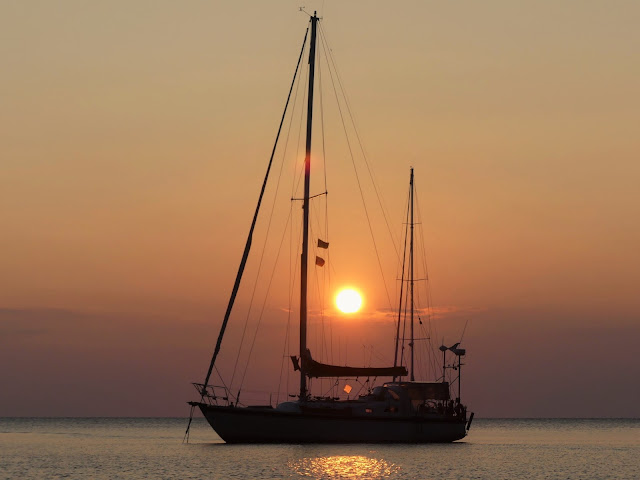 |
| Farewell sunset |
It was with a leaden heart that in the new
morning, with children already laughing in the shallows, and the wisp of home
fires in the village heralding the new day, that we drew up our anchor, and
made our way out between the reefs before turning our bow to port and Loltong
quietly slipped from view. We had some 18nm to cover down Pentecost’s leafy
coastline before we arrived at an anchorage called “Waterfall Bay”. South of
Loltong, where embayments are at a premium and therefore, when we arrived at
the anchorage, courtesy the Cruising Guide, we nestled in square with the
coastline where winds from the south through to the north via the west would
make the anchorage untenable. In no time a ship on the horizon morphed into a
local trader, functional, not pretty, and surprised us by steaming in between
us and the shore, before releasing its tender with a clutch of parcels to be
ferried ashore and placed under a foreshore tree, of substantially less
grandeur than Loltong’s spreading Banyan. As the ferry chugged its way to the
north, a utility arrived, the parcels were collected and the consignment
process was complete, Pentecost style. With a light easterly predicted we felt
secure enough to head ashore, just as Patrick and Murielle arrived to make it
two ships in the anchorage.
 |
| Close encounter with the ferry |
 |
| Waterfall Anchorage |
Naturally, with the anchorage named
“waterfall” we were keen to find this aquatic feature, especially given the
delight we had in the cascade at Asanvari. Before finding a river mouth and following
the flow upstream, we stretched our legs in the direction of Ranwadi the local
village, which we failed to find although we fell upon, and into, the shore-side
Ranwadi Bakery, which is less “backyard” and more extensive than others we have
seen owing to the fact that it is a major supplier, not only to local folk, but
to the significant, live-in, Ranwadi Churches of Christ College, that sits atop
the hill above the coastline. The college has had a major face-lift in recent
years, which has included the construction of some impressive, lit sporting
grounds alongside the coast road which has been part of a significant aid
contribution by the Australian Government, designed to assist key schools on
selected islands in Vanuatu. It was heartening to see Aussie aid being directed
at education in this way, as not only do local children view learning as
valuable, it is certain that Vanuatu will need as many trained young people as
it can get in order to face the challenges that are there now, and into the
future. We climbed up to the school and, it being a Saturday, took an
undisturbed look around, causing considerably less mayhem than we did in
Labultamata!
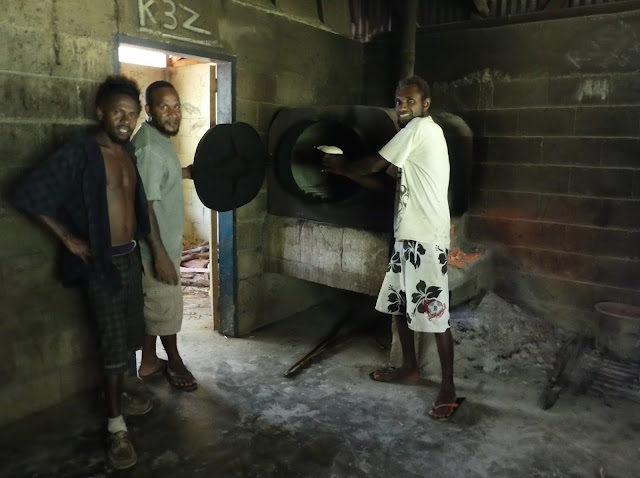 |
| The Ranwadi Bakery |
Back near the anchorage, our search for the
waterfall upstream looked to be thwarted, as we could find no track of any
substance beside the river, and likely pathways disappeared into the backyard
of some local dwellings where washing hung, chickens roamed but no-one could be
found to set us aright. Eventually a group of local girls near the beach, no
doubt enjoying their weekend away from school, put us on our way and we
eventually found an attractive hedge-rowed path leading up to what was a hugely
impressive waterfall. With a group of local teens in understandable possession
at the falls, we satisfied ourselves with a refreshing plunge in a burbling
rock pool downstream, although we were horrified to see some of the teens, atop
the falls, and edging way too close to a slippery oblivion for our risk-adverse
liking, whilst beckoning to their mates below. Maybe this is another form of
indifference to the fear of heights that is obviously a hallmark of the famous
tower diving exploits of local men, seen annually in Pentecost in April, May
and June.
 |
| Was worth the search...a great waterfall! |
Our evening at “Waterfall” proved to be an
uneventful one on this coastline, although back at home it was AFL Grand Final
Day, and I took the opportunity to attempt to search our HF Radio in the upper
reaches of the 15 to 17 kHz bands in an attempt to secure a “feed” to the game
via the ABC and Radio Australia. Eventually, way up on 17840 kHz, there it was,
the footy, direct from the “G”, complete with the dulcet tones of the ABC
commentary team, as clear as if we were tuning in from the Fitzroy Gardens. What
a place, here off Pentecost Island, from which to hear the history making win
by the Western Bulldogs over Sydney. Many thanks, Aunty, and Radio Australia.
Selwyn Strait separates Pentecost Island from
the island of Ambrym, and we were away early next day to make the comfortable
20 odd mile passage to the anchorage and village at Ranon Bay on Ambrym’s north
coast, to allow time for some exploration ashore. Ambrym is a volcanic island,
dominated by the conic forms of Mount Marum and Mount Benbow, which are both
decidedly active, and attract trekkers from around the world to what is a long,
tiring but spectacular two-day experience, that allows visitors to peer in awe from
the crater rim to the fiery cauldron below. For us fitting in a trek was not
possible, but from our anchorage at Ranon plumes of smoke billowed upwards, and
drifted away to the north-west. Some sailors, anchoring on Ambrym’s north coast,
have found that a wind-shift to the south can leave a boat smothered with
extract of volcano.
 |
| Ranon Bay |
Ashore at Ranon was a flimsy experience
compared with, say, our time at Asanvari or Loltong, although in fairness we
had little time to make anything other than a cursory connection with locals,
who were curiously thin in numbers on the ground. Kids who we came across,
responded to our “hellos” with unabashed requests for “lollies” or “money”,
which drew little response from us, so after a walk along a coastal track
beyond the village, it was not long before we made our way back to Calista. There is no doubt that the
highlight of our brief visit to Ranon, came at night when the fireside glows
from the twin volcanoes lit up the southern sky with an arterial glow, as
nature’s blast furnaces gave us one of the most unusual backdrops to an
anchorage that we have ever had. It was impossible to go out into the cockpit
in the evening without staring in wonder at the curtains of red hanging over
Marum and Benbow; dancing and flickering in the night sky as they reflected the
fiery furnaces below. Seeing this spectacle was reason alone to cherish a
stopover on Ambrym. There are times when Cookie’s illustrated diary of this
voyage, which is now well into volume 2, causes her to ruminate on a sketch
that best represents the day, but on this occasion the brooding spectacle of
the peaks to our south was an obvious choice, and her red “Derwent” was soon
pressed into service.
For some days we had been dissecting the
regional wind forecasts via the Predict Wind program, searching for the best
“window” of wind to make the passage around Ambrym to head for an anchorage on
Epi Island, and thence to bear away a little for the long day sail back to
Havannah Harbor on Efate, just shy of Port Vila. Once around the eastern point
of Ambrym, the path to Epi is to the south-east, or directly into the face of
the prevailing wind. Therefore we were looking for winds that were not
south-east, and our best option was a light easterly, that we could at least
motor-sail into to reach Epi, and if it held, hoist everything and sail our way
back to Efate the following day. Planning passages to make the best of the wind
and sea states can make all the difference in achieving an enjoyable experience
at sea. A promising “window” had emerged for us to achieve this but we needed
to wait one more day on Ambrym before heading to Epi, so in the meantime we had
been searching the Cruising Guide for another anchorage on Ambrym that had
potential interest.
 |
| Morning light on Mt Marum & Mt Benbow |
Just six miles to Ranon’s east lay the
anchorage at Bavanna Bay, which, according to the guide, was blessed with a
“hot spring” leading to a warm rivulet flowing out to sea. There have been
times when cruising in South Australia in winter, when the promise of an
immersion in a hot spring would come as a gift from Heaven, and as we had never
experienced such a phenomenon in our travels, heading to Bavanna was an obvious
choice. Once anchored there, we hastened ashore to a steeply sloping black sand
beach, and a surrounding aspect that was devoid of the lushness of Pentecost
and Maewo, possibly due to the fallout that often descends from Marum and
Benbow. We may have overcooked our hopes for the hot spring, for instead of an
oasis like nirvana with steaming pools set under swaying palms, the soak by the
sea was slimy, weedy and uninviting. There would be no luxuriating in a hot tub
in Bavanna Bay, although where the marsh issued out to the sea the water was
warm beyond tepid, but probably wasted in a clime such as this. There was no
settlement nearby, and so, in solitude, a swim in the bay was an instant and
welcome attraction. The cap to the unusual nature of this place came whilst
swimming when, upon digging our feet into the sand, we struck sub-surface water
almost too hot for the touch. Our thoughts did fly back to our stoic friends at
Port Elliot, where from the Surf Club hardened souls swim through the winter,
and having just endured the coldest and wettest September on record, they would
have liked to have joined us to dive without flinching in the warm waters of
Bavannah. That evening we were disappointed to find that from the bay, we could
not sight the peaks of Marum and Benbow, although on sunset, the plume from
their vents gave us a sunset that was truly spectacular.
 |
| Water Temperature.....27.9 deg & hot sand ! |
 |
| Amazing sunset |
It was but a handful of miles from Bavanna
Bay to Ranwakon (Dip) Point on the eastern tip of Ambrym and when we got there
in the morning we were happy to find that the winds were agreeable, the sea was
kindly and that we could make all haste to Epi. Just around Dip Point is found
the anchorage at Craig Cove, which we had considered, but had rejected, in
favour of Bavanna Bay. When abeam of it we noted Farr Flyer in the anchorage on AIS, so we called up Jerry and
Carmel, to find that, having been delayed considerably in Port Vila with water
maker problems – we do not have a water maker, we have 500l and frugality -
they were headed for the Isles that we had just visited. After helping with
enquiries that they had and wishing them well on their journey, we got a call
from Jody and Simon, off Manoroa 2 with more questions still, as they planned
their passage to the north. Having met back in Noumea it was great to
re-connect with these fine people as we passed, like ships in the night.
 |
| Dolphin escort enroute to Epi |
Our passage to Epi was an enjoyable one, with
Ambrym falling astern in the mist, and us “glassing” Paama Island and the
classically cone shaped Lopeui Island, south of Ambrym, to port, where, if time
had permitted, there were more attractive anchorages just waiting to be
explored. For a time the breeze swung off the bow and we romped along under
sail, before, off Epi and on our way to Revolieu Bay, the wind faltered,
dropped out, and we noted a concerning line of whitecaps away off our bow.
Knowing that nearby Lamen Bay probably offered better protection; we swung our
head to port, and found, on anchor, that when the wind did come it issued from
an unexpectedly north-easterly direction, but friendly for us where we lay. In
the end, we had time to go ashore for another stroll around town where we took
a quick look at the local stores, marvelled at some ladies weaving their
colourful mattings, and generally stretched our legs before the final passage
back to Efate.
 |
| Colourful handicraft |
Apart from some raucous roosters, all was
subdued when we eased out of Lamen Bay in the pre-dawn, just as the sky turned
caramel in the east. In an hour or so we had passed Cape Foreland, succulent cheese
and tomato jaffles had issued from the galley and with mugs of tea at the
ready, we set a stabilising mainsail, before passing Revolieu Bay in search of
better winds beyond Maling Point, in the open seaway beyond Epi. It was not
long before the light airs of the morning became firmer winds of the day and we
were able to set a full pattern of sails and leave the navigation to “Tim” our autopilot.
These were conditions that could make a salt dewy eyed with delight: a
fathomless sea of blue tending to purple, Flying Fish skipping all about, the
majestic Emae and Makura Islands off to port, friendly cumulus clouds floating
over an azure sky, and us with time on our hands once the sails were tweaked,
to lie back, relax and take it all in. Eventually Epi fell over the horizon
astern as Efate, with the grand double peaks of Nguna Island and its handmaiden
Pele to its immediate north, as the entrance to Havannah Harbor became clearer
ahead. Inside the harbor we doused sails and headed for the Ai Creek anchorage
across the bay that we had used on our passage north. Compared with our
experiences north of Epi; to be anchored outside the bright lights of holiday
houses, and to hear the noise of vehicles on the main road behind was to know
that civilization lay ahead and the description of the islands of Vanuatu
where, according to Linda Kalpoi, General Manage Vanuatu Tourism…”unspoilt
living in villages, where life is carefree, and the friendliest people are
waiting to greet you” was now probably astern of us, and over the horizon.
 |
| Great sailing |
 |
| Entering Havannah harbour...with so many amazing memories & experiences! |
In departing Havannah Harbor for Port Vila in
the morning, we passed by Lelepa and Eretoka (Hat) Islands before warily making
our way around Devil’s Point outside Mele Bay, where turbulent currents can
make the entrance into Port Vila an unpleasant experience. A radio call to
Leimara from Yachting World saw us placed in the redoubtable hands of Moses and
Willy who guided us to our mooring off Iririki Resort, where for $15 we get the
same view as those in the Overwater Bungalows of Iririki, but at a fraction of
a cost.
 |
| Moses & Willy escort us to our "Resort" mooring |
Our voyage to the fabled isles to the north
of Port Vila had been blessed with a pattern of fine weather that was beyond
our fondest hopes, in stark contrast to what Anne and John Marley on Essex Girl, had experienced just a year
previously. We had been fortunate, indeed, with the only drawback being onshore
sea-breezes that occasionally made anchorages bumpy during daytime and a
general shortage of winds that sometimes saw us motoring when we preferred to
sail. We had covered 508 sea miles in the islands, and had more memorable
experiences than we could possibly cover in these pages. In some small way we
were reminded of the great traveller Marco Polo, who, in the Middle Ages, made
it all the way to China via the silk road, and returned to the Mediterranean
years later with incredible tales from the Orient. On his deathbed, religious
clerics gathered, hoping to see him recant his extraordinary stories, but Polo
was defiant, and rose on an elbow to declare…..”I did not tell you half of what
I saw”. Yes, we have been fortunate indeed to have had the experiences that we
have shared in Vanuatu’s wonderful islands amongst its wonderful people.
We looked forward to our return to Port Vila
before planning our return to Noumea and the long haul back to Australia. A
great many sea miles still lay ahead of us, but the balmy days we had enjoyed
in Vanuatu’s islands were certain to linger long in our memory, as we make our
way back to New Caledonia and beyond.




















































What an adventure!
ReplyDeleteWhat an adventure!
ReplyDeleteWhat an adventure!
ReplyDeleteHello Everybody,
DeleteMy name is Ahmad Asnul Brunei, I contacted Mr Osman Loan Firm for a business loan amount of $250,000, Then i was told about the step of approving my requested loan amount, after taking the risk again because i was so much desperate of setting up a business to my greatest surprise, the loan amount was credited to my bank account within 24 banking hours without any stress of getting my loan. I was surprise because i was first fall a victim of scam! If you are interested of securing any loan amount & you are located in any country, I'll advise you can contact Mr Osman Loan Firm via email osmanloanserves@gmail.com
LOAN APPLICATION INFORMATION FORM
First name......
Middle name.....
2) Gender:.........
3) Loan Amount Needed:.........
4) Loan Duration:.........
5) Country:.........
6) Home Address:.........
7) Mobile Number:.........
8) Email address..........
9) Monthly Income:.....................
10) Occupation:...........................
11)Which site did you here about us.....................
Thanks and Best Regards.
Derek Email osmanloanserves@gmail.com
Hello Everybody,
ReplyDeleteMy name is Mrs Sharon Sim. I live in Singapore and i am a happy woman today? and i told my self that any lender that rescue my family from our poor situation, i will refer any person that is looking for loan to him, he gave me happiness to me and my family, i was in need of a loan of S$250,000.00 to start my life all over as i am a single mother with 3 kids I met this honest and GOD fearing man loan lender that help me with a loan of S$250,000.00 SG. Dollar, he is a GOD fearing man, if you are in need of loan and you will pay back the loan please contact him tell him that is Mrs Sharon, that refer you to him. contact Dr Purva Pius,via email:(urgentloan22@gmail.com) Thank you.
BORROWERS APPLICATION DETAILS
1. Name Of Applicant in Full:……..
2. Telephone Numbers:……….
3. Address and Location:…….
4. Amount in request………..
5. Repayment Period:………..
6. Purpose Of Loan………….
7. country…………………
8. phone…………………..
9. occupation………………
10.age/sex…………………
11.Monthly Income…………..
12.Email……………..
Regards.
Managements
Email Kindly Contact: urgentloan22@gmail.com
Kolkata escorts The data driven substance which you have conveyed is greatly helpful for me to increase some new valuable information and enhance my aptitudes. I for the most part look for some wonderful audits that can give me an unrivaled taking in comprehension and from your article, I adjusted some sensible stuff. The exquisitely created and capable substance is greatly extraordinarily steady that I would love to examine and yet again.
ReplyDeletekolkata Escorts
Kolkata call girls
Escorts in kolkata
Call girls in Kolkata
Kolkata escorts services
Escorts services in Kolkata
Kolkata independent escorts
Independent Kolkata escorts
Kolkata escorts photos
Kolkata Call Girls photos
Kolkata escorts services
Kolkata call girls services
Kolkata Escorts
Escorts in Kolkata
Kolkata independent escorts
Independent Kolkata escorts
Independent Kolkata escorts have gone through the details of several articles but did not find the relevant stuff which I came across in your write-up.
ReplyDeletekolkata Escorts
Escorts in Kolkata
Independent Kolkata Escorts
kolkata Independent Escorts
Kolkata Escorts Services
Escorts Services in Kolkata
Kolkata Call Girls
Call Girls in Kolkata
Independent Kolkata Call Girls
kolkata Independent Call Girls
Kolkata Call Girls Services
Call Girls Services in Kolkata
Kolkata Call Girls Photos